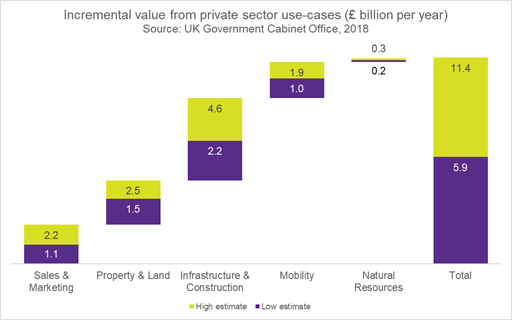Are you sitting on a geospatial geyser?
The potential of geospatial data as a source of value is limited only by our imagination … and our ability to manage its increasing volume.
Up to £11 billion a year of economic opportunity could be unlocked by using geospatial data more productively. That’s according to UK Government analysis which quotes Chancellor of the Exchequer Philip Hammond as saying:
“The UK has some of the best geospatial data in the world, and much of it is held by public bodies. The potential economic value of this data is huge.”
The £11 billion figure is an estimate of private sector benefits only and calculated on potential productivity impacts (savings in time, fuel and materials) across five “themes”:
- Sales and marketing
- Property and land
- Infrastructure and construction
- Mobility
- Natural resources

You can find the full analysis, here (PDF).
But, the true potential could be even greater. Using already available databases of geospatial information and drawing together different sources of data, many new location aware technologies are revolutionising the economy and further driving innovation. There are now many examples of dramatic savings generated, value created and innovative uses of geospatial data.
In its recent report on the Future Chief Data Officer, Raconteur described several examples including a model for predicting the location and timing of flu outbreaks and a global initiative to tackle illegal deforestation.
In a now famous example, logistics firm UPS saved three million gallons of fuel (and 31,000 tons of CO2 emissions) in a single year with its No Left Turns policy.
Other examples include:
- Precision agriculture
- Better informed insurance
- Connected infrastructure planning
- Fraud reduction
As sparkgeo’s CEO Will Cadell wrote recently,
“Interestingly, this [geospatial] revolution will likely happen quietly. You might not even notice that search results are more local, or that your Uber arrives faster or that parcels will get delivered to wherever you happen to be. All you will see is better service and better products.”
In fact, the world has woken to the value of data. Data, as they say, is the new oil – a valuable commodity fuelling innovation and growth.
Refining the new oil
Like oil, crude data needs to be processed and refined to become more than an opaque, black sludge. Unlike oil, however, the supply of data is increasing rapidly, putting strain on in-house refining processes.
Those strains are particularly acute where real-time (or near real-time) data feeds real-time or automated decision-making. Geospatial data can only drive sustainable value if it is reliable. Currency is important but quality is key. Traditional approaches to data management and the maintenance of data quality are labour-intensive and time-consuming. Typically, they are unable to cope with the volume and speed with which the new data-oil emerges from the well.
Where data production is automated, the only sustainable answer to processing or refining it must also be automated.
That, of course, is where we fit in: making data smarter for a smarter world.
It’s also relevant to the Smarter Data, Smarter World Conference. You can learn more, and register to attend, here.

